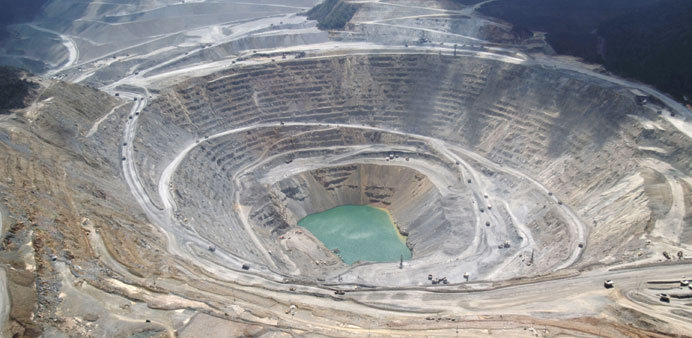An aerial view of the Newmont mining pit in Batu Hijau, Jakarta. The mining company yesterday warned that it may lay off thousands of more workers following Indonesia’s controversial decision to ban exports of unprocessed minerals.
DPA/Jakarta
Indonesia’s controversial decision to ban exports of unprocessed minerals is triggering unintended but predictable consequences: about 500,000 mining workers are losing their job.
On January 12, Jakarta announced new regulations banning the export of mineral ores as part of efforts to keep a greater share of resource profits in the country, one of the world’s biggest producers of minerals such as copper, gold and nickel.
But a month after the ban was imposed, more than 570,000 people working in the mining industry have been left without work as companies halt operations, said Juan Forty Silalahi, spokesman for the National Mining Workers Solidarity lobby group.
“The number will continue to increase unless the government reviews the ban,” Silalahi said.
“Small businesses are paralysed,” he said. “People selling goods to workers, residents who rent out their places and relatives who depend on them are also affected.”
Companies and industry experts had warned that the ban, mandated by a law adopted in 2009, would trigger mass layoffs and reduce export revenues at the time when the economy is showing signs of a slowdown.
“I haven’t worked for a month,” said Edi Akbar, 27, who worked at the nickel mining company Stargate Pacific Resources in Konawe Utara, North Sulawesi province.
“I can’t ask for severance pay because the company is not producing and doesn’t have money,” he said by phone.
The regulations require companies to process raw materials domestically to produce outputs of higher value, but industry players argue that building smelters is not economically viable because it needs large investment.
The biggest foreign mining companies operating in Indonesia, Freeport McMoRan Copper & Gold Inc and Newmont Mining Corp, were granted a temporary reprieve, but they complained that a new export tax of 25% for metal concentrates was a big burden and warned that they might have to lay off thousands of workers.
The export tax for metal concentrates rose from 20% to 25% and will gradually go up to 60% by the end of 2016.
On Thursday, about 1,000 Freeport workers in Papua province rallied outside the district council of Timika to demand the government review the legislation.
“The export ban is threatening the livelihoods of workers,” said Hengki Binur, a union leader.
“We hope the government will consider the fate of 30,000 workers,” he said. “They are not just a number, but people who are desperate for employment.”
Deerd Tabuni, speaker of the Papuan legislature, warned that half of the 30,000 empoloyees of Freeport could lose their jobs.
“I recently went to Freeport and found that concentrate machines no longer operating,” he said. “Trucks did not operate and even employees have stopped working.”
Energy and Mineral Resources Ministry spokesman Saleh Abdurrahman said the ban would be good for Indonesia in the long term.
“Revenues generated by concentrate exports were very small,” he said “After they were processed overseas, we imported them back at higher costs. This is not fair.”
But the ban appears to have wider repercussions, with companies that make finished products saying they were also affected.
Dieter Seng, the president director of Sud-Chemie Indonesia, a producer of bentonite and a unit of Switzerland-based Clariant International Ltd, said his company had export permits that were due to expire on February 14.
He asked Deputy Trade Minister Bayu Krisnamurthi at a discussion organised by the Jakarta Foreign Correspondents Club if they could be extended.
Krisnamurthi said that he would look into the matter.
“Friday is Valentine’s Day, so love is in the air, just wait and see,” he told a puzzled Seng.
Krisnamurthi also said the government had anticipated the impacts of the ban, including on the trade balance.

